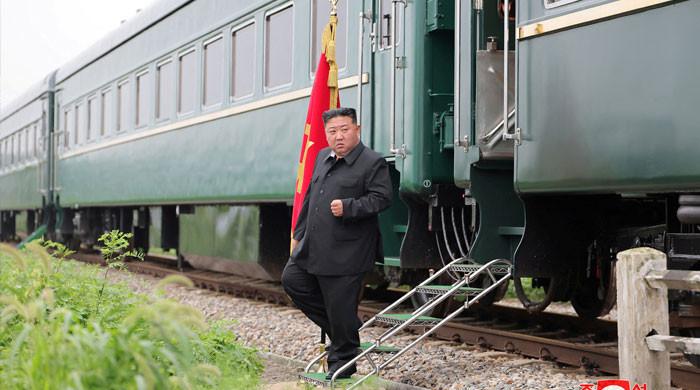Kim Jong Un Enters China for Beijing Military Parade with Xi Jinping and Vladimir Putin
Kim Jong Un
Enters China for Rare Military Parade with Xi and Putin in Show of Unity.
Kim Jong Un
arrives in Beijing via armored train to join Xi Jinping and Putin at China's
largest military parade. The rare public appearance signals a deepening
trio-alignment amid rising global tensions.
North Korean leader Kim Jong
Un steps off a train during a visit to a flood-affected area near the border
with China, in North Pyongan Province, North Korea, in this undated photo
released July 31, 2024 by North Korea's official Korean Central News Agency. —
ReutersA train carrying North...
In a rare diplomatic move, North Korean
leader Kim Jong Un crossed into China aboard his armored train to attend
a grand military parade in Beijing on September 2–3. His journey marked
his first venture beyond his isolated nation since 2019, and perhaps more
importantly, his first appearance at a major multilateral event in over 14
years.
At the heart of Tiananmen Square, Kim
joined Chinese President Xi Jinping and Russian President Vladimir
Putin, standing shoulder to shoulder in a public display of solidarity.
This marked the inaugural public convergence of these three powerful leaders.
Their presence—amid the glittering military display—sent a clear signal to the
world about the emerging geopolitical alignment reshaping global power
dynamics.
The parade, which commemorated the 80th
anniversary of Japan’s WWII surrender, was China’s largest ever and
showcased its evolving military capabilities—from hypersonic missiles to
unmanned combat drones and a full nuclear triad. Xi delivered a potent message,
declaring the world stands at a crossroads: “peace or war, dialogue or
confrontation,” and reaffirming China's unwavering advance.
A Diplomatic
Renaissance for Kim Jong Un
Kim’s arrival was much more than
ceremonial; it reflects a tacit normalization of his global standing. Once
among the most isolated leaders, Kim now shares the stage with major world
figures. That visit included high-security protocol, indicative of China’s
resetting of ties with Pyongyang. Accompanied by Foreign Minister Choe Son
Hui and reportedly his daughter Kim Ju Ae—viewed as a possible
successor—Kim embodied both legacy and continuity.
Amid swirling speculation, South
Korea’s intelligence briefed that Kim could stand with Xi and Putin at the
parade’s rostrum and engage in bilateral discussions with both leaders—further
reasserting North Korea’s growing diplomatic relevance.
A Triad of Power,
Poised Together
Xi, flanked by Putin and Kim, cast the
military spectacle as a carefully choreographed moment of global solidarity.
The three leaders—each challenged in different ways by Western influence—were
joined by dozens of other state dignitaries, and together on display was a
shared message: unity and defiance. Analysts see the event as a milestone in
the forging of what has been dubbed an “axis of upheaval.”
Their proximity and mutual attendance
not only underscored diplomatic synergy, but also hinted at deeper strategic
cooperation. Putin publicly thanked Kim for North Korea’s military support in
Ukraine, while Kim characterized helping Russia as an “obligation… a fraternal
duty.”
Global Ripple Effects
For the West—particularly the U.S.—this
parade was more than ceremonial. The absence of Western leaders contrasted the
strong show of unity among these three authoritarian figures. Xi’s call for a
"new world order," coupled with the unveiling of advanced weaponry,
stirred apprehension: A new Cold War alignment may be taking shape.
U.S. political figures did not hold
back; former President Trump sarcastically accused the trio of plotting against
America. Putin’s aide quickly denied any conspiracies, framing the event as
symbolic rather than combative. Nonetheless, the optics of the public alignment
are difficult to downplay.
What This Signals
Going Forward
Kim’s presence at this display in
Beijing isn't just about ceremony—it’s a strategic pivot. For North Korea, it
opens avenues for economic and military cooperation, especially as tensions in
Ukraine continue and reliance on allies grows.
For China, allowing such a platform
underlines its desire to challenge Western narratives and present an alternate
global order. For Putin, it reinforced Moscow’s alliances amid its
international isolation due to the Ukraine conflict.

